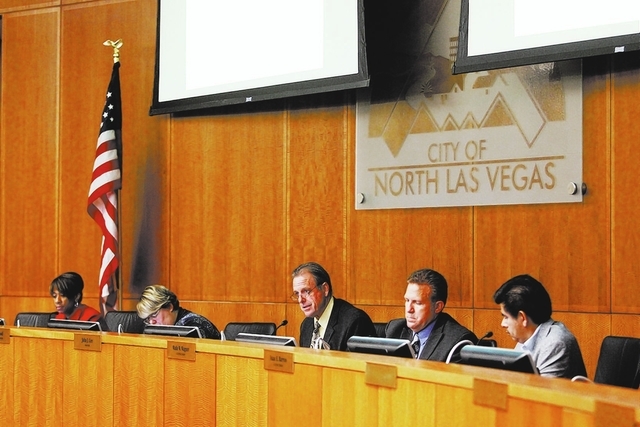North Las Vegas: A city on a financial edge
North Las Vegas is a city on the brink.
On the brink of financial insolvency.
On the brink of a state takeover.
And, if you believe the city’s new leadership team, on the brink of a turnaround.
“The darkest hour is just before the dawn,” said Darren Adair, the city’s new finance director.
In this city of 222,000 people, it has been mostly pitch black zero-dark-thirty for years, financially speaking.
Mayor John Lee, on the job since July 1, said past spending practices, falling tax collections and the recession put North Las Vegas deeply in the red.
But, he predicted, future initiatives that include sharing services with Las Vegas, selling or leasing city property and attracting more business will slowly restore the city to financial health.
Lee, a Democrat, plans in his state of the city address Thursday to give a largely upbeat assessment of the possibilities for North Las Vegas if the city works closely with neighboring municipalities on regional budget solutions.
Lee said a team effort is needed to solve the problems, not cutthroat competition for resources.
“This is not as bad as having cancer. And I’ve survived that,” Lee said last week. “I do not go to sleep at night thinking tomorrow is the last day North Las Vegas is going to be in existence.”
LOOKING FOR DIMES
Still, Nevada’s fourth biggest city by population has been on life support for years, relying on siphoning money from its utility fund to balance its general fund budget to the tune of at least $200 million in recent years, Lee said.
USA Today recently named North Las Vegas the nation’s eighth worst-run municipality.
In 2011, there was serious talk of the state taking over the debt-ridden city — under Nevada law municipalities can’t declare bankruptcy — as record home foreclosures gave it the look of an abandoned metropolis where vibrant life and rapid growth had bloomed for a decade.
Instead, the Nevada Legislature allowed cities like North Las Vegas to tap enterprise funds in financial emergencies, but only until 2021. That sets a deadline for North Las Vegas to get its financial house in order.
In recent years, the city has gone to court to fight police and firefighter unions that resist wage and benefit concessions. It has shed more than 1,000 employee positions and shaved $211 million from its bottom line since 2008. It remains the state’s largest junk bond-rated municipality.
The situation is so precarious that if North Las Vegas loses a pending $25 million union lawsuit, the city could be forced into receivership.
The city has only $9 million in reserves out of a total annual budget of $481.5 million.
“We are not crying wolf,” Lee said of his city’s dire finances.
Yet he said he won’t surrender to state control.
“We don’t have to find dollars,” Lee said. “We just have to find a lot of dimes.”
City bylaws require North Las Vegas to keep 8 percent of its general fund in reserve, which it now has. A state takeover is triggered if that amount drops below 4 percent.
Lee said he is starting with a clean slate by telling residents just how bad the budget books are.
Last week, North Las Vegas for the first time assessed the financial damage it expects before its ability to tap the utility fund expires in 2021. It painted a bleak picture:
Over the seven years, North Las Vegas’ deficit spending would grow nearly every year, for a total of $152.6 million in 2021. And that’s if the city keeps using up to $32 million a year from the wastewater fund.
If the city doesn’t use the fund, and makes no other changes, the accumulated deficit would total $327.5 million by 2021, Adair said.
“The deficit is beyond the city’s ability to solve,” said Adair, who called it a “structural deficit.”
In other words, unless North Las Vegas raises more revenues and cuts costs, it cannot survive and the state would take over.
Such a move would impact the entire region, hurting bond ratings, property values and development possibilities countywide. It also could allow the state to raise property and other taxes and fees to maximum rates to earn new revenues.
“The state does not want to be involved,” said Marvin Leavitt, chairman of the Committee on Local Government Finance, which must sign off on city fund transfer requests before they can occur. “Local governments themselves are best able to handle local government. I think they are having real difficulty, but there is a real attempt to turn this situation around.”
Assembly Speaker Marilyn Kirkpatrick, D-North Las Vegas, put a positive spin on the situation.
Kirkpatrick has long criticized past city leaders for inadequately dealing with budget problems and for cutting services, including short-term park closures. But she said the new leaders are acknowledging deep problems and digging for long-term solutions.
“They didn’t get into the problem overnight, and so they’re not going to get out of the problem overnight,” Kirkpatrick said. “Now, they’ve actually been able to get a clear understanding of what they have and where they need to go from this day forward. They’ll probably chart a different course.”
SHARING SERVICES
This could be North Las Vegas’ last chance to get it right. A businessman and former state senator, Lee cleaned house when he took office and has a new finance director, city manager and chief of staff.
Working closely with neighboring Las Vegas is key, city leaders say. The two cities in November formed an 11-member “shared services” committee, which has met twice and is to meet every couple of weeks through May 1.
The panel is looking for areas where sharing services would cut costs, raise revenues or be more efficient. Areas they are looking at include economic development, redevelopment, finances, business licenses, parks/community centers, animal control, nonsuppression fire support services, traffic operations, information technology, purchasing, libraries, vehicle fleets, courts and utilities.
Outsourcing some services is on the table, committee members say.
Decisions could be made before the panel completes its work May 1, too.
“This in no way is going to solve the financial challenge of North Las Vegas, but it’s going to be an important piece,” Thom Riley, a consultant for the committee, said when the committee first met on Dec. 19.
Las Vegas City Manager Betsy Fretwell said any shared services agreement must benefit both cities.
“Clearly, North Las Vegas needs bolstering, but we’re still climbing out of our deficit,” said Fretwell, who is among city officials advising the committee. “This has to be mutually beneficial.”
Fretwell cited detention as the best example of successfully sharing services. North Las Vegas closed its jail in 2011, and Las Vegas now houses both cities’ inmates.
Fretwell said North Las Vegas saves $11 million to $15 million a year while paying Las Vegas $5 million to $7 million annually.
“If we could find a couple more of those it would be awesome,” Fretwell said.
Not all Las Vegas officials are enthusiastic about helping North Las Vegas.
“I worry about whether we can save enough money to make up for the deficit here, the structural deficit you have,” Las Vegas Councilman Bob Coffin told Adair, the finance director of North Las Vegas, and Jeffrey Buchanan, the interim city manager, following a shared services presentation last week.
Las Vegas Councilwoman Lois Tarkanian said she is worried the jail deal means more work for Las Vegas corrections workers, and she doesn’t want shared services to become a drain on the city.
“I have a great concern we don’t cannibalize our own situation,” Tarkanian said.
OPEN TO INDUSTRY
North Las Vegas was founded in 1946, the same year Bugsy Siegel opened the Flamingo on what would become the Strip. North Las Vegas has always been more industrial than glamorous.
Nearly half of the 100-square-mile city — some 30,000 acres — remains undeveloped. A city with that much room to grow leaves a lot to the imagination.
A state-of-the-art thermal energy plant has applied to build in the area, and officials hope the city can land a proposed Southern Nevada medical school that could be built near the Veterans Affairs Medical Center off Pecos Road and the 215 Beltway.
Much is riding on the future of a 22,000-acre business development zone, the APEX Industrial Park, west of Interstate 15. The two-decade-old park, annexed by the city in 2008, is already home to a solar power plant, open-pit mining operation and 1,800-acre landfill.
All that stands between the city and millions more in APEX-related property tax revenues is water. Only some of the site is tied into Clark County’s water grid or the city’s own nearby $300 million wastewater treatment plant.
Lee hopes to see those hookups in place by year’s end.
“It’s a huge industrial area for us, and we’re just cutting a deal with the county now to tie into their sewer (infrastructure) and start building out there,” Lee said.
He also points to Park Highlands, a 1,500-lot master-planned community between Centennial Parkway and Grand Teton Drive, which could start construction this year.
Park Highlands “is really the only undeveloped master plan of its size left in the valley; so, if we handle that and the APEX build-out correctly, I think the city will go from being the region’s unwanted stepchild to being its prince,” Adair predicted.
CUTTING COSTS
For now, the city government itself has too much empty, money-wasting space.
Despite the recession, North Las Vegas broke ground on a new City Hall in 2008. The nine-story, $130 million building opened to much criticism in 2011 and remains half-empty.
The entire fourth floor is vacant — a ghostly testament to dashed dreams of unending growth — with some office doors still bearing name tags of police officials whose headquarters was never moved there.
City officials are looking to sell or lease the empty space, as well as other real estate. They are in negotiations on a $1.8 million sale of the current police building to North Vista Hospital.
The 430-member police force, about half its former size, might move to a building near the old city hall or into the city’s Justice Center.
The old city hall, which was recently rented at $30,000 for use in filming a Martin Lawrence movie, is also on the block.
Dumping unneeded real estate will help, but the city has less flexibility where it spends the most. The salaries and benefits for North Las Vegas’ public service employees account for about two-thirds of the budget and much of the deficit problems. Yet talks on sharing services don’t include consolidation of police and fire departments, partly because of collective bargaining agreements.
Despite Lee’s efforts, there is little trust between the city and its unions. Leonard Cardinale, president of the Police Supervisors Association, said it’s possible that the city can get out from under its structural deficit, and the unions won’t consider concessions until the city can provide a line-item review of its finances.
“We’re not buying the numbers,” Cardinale said before a Jan. 7 special City Council meeting to review city finances. “We’re going to trust the new management, but we’re also going to verify. If they can prove that they’re broke, then we’ll do whatever it takes.”
Cardinale said cost-of-living adjustments and merit raises baked into city budget projections paint an unnecessarily bleak picture of municipal finances. Police supervisors haven’t taken a cost-of-living raise in years and gave back a 4.25 percent pay increase during the last round of contract negotiations, he said.
Asked about Adair’s remark that a court decision favoring city unions could “hand bargaining groups the keys to the city,” Cardinale shrugged.
“I’ll run the city,” he said. “We told him we’ll do what they did in Scranton, Penn., where a judge ordered (the unions) to seize city assets and sell the utilities.”
Ward 3 Councilwoman Anita Wood, who was re-elected in April without union support, took a sunnier view of upcoming contract battles.
Two major contracts expire by the end of the year, and two others are set for renewal by the end of 2015, Wood said. For the first time in a long time, the city won’t have to go hat-in-hand to its bargaining groups, she said.
“Over and over, time and again, we hear from our bargaining groups that they don’t trust the numbers,” Wood said. “To some extent, I think they’ll always say that. But you’re seeing the numbers. I’m seeing the numbers. The public is seeing the numbers. We are doing everything we can to get those numbers out, and they are what they are.”
TOO BIG TO FAIL?
Most public officials working to save North Las Vegas say the city is simply “too big to fail.”
But smaller municipal failures have happened, though rarely. The small mining city of Gabbs disincorporated in 2001 because declining tax collections couldn’t pay for the city government.
The state last took over a municipality’s finances in 2005, when White Pine County overspent its budget by $250,000 despite more than $1 million in cuts. Oversight lasted four years, with state and county officials clamping down on expenses and levying temporary taxes on hotel rooms and government services to quickly build a reserve fund.
State tax officials took control of the White Pine County School District in 2000, and had final say over the district’s expenditures for five years.
North Las Vegas is at a crossroads, said Carole Vilardo, president of the Nevada Taxpayers Association and a member of the shared services committee.
She sees an all-out effort by regional leaders to save the city from itself and from state control. But it might take years, and the city will likely walk a fiscal tightrope for some time to come.
“I don’t know that the danger is over for North Las Vegas,” Vilardo said. “The shared services committee is going to try to work to put them on the road to financial solvency. I’m being positive at this point, but this is something that only time will tell.”
Contact Review-Journal reporter James DeHaven at jdehaven@viewnews.com or 702-477-3839. Contact Review-Journal reporter Laura Myers at lmyers@reviewjournal.com or 702 387-2919. Follow her on Twitter @lmyerslvrj.

















